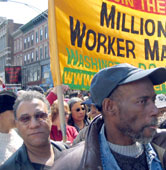On to May Day
Published Mar 30, 2005 10:26 AM
From a talk given by Workers World Party leader Larry Holmes at a
March 25 meeting in New York.
|
Larry Holmes, left,
in Harlem on March. 19.
|
The origins of May Day are in
the struggle in this country in the 1800s for an eight-hour day, and the heroic
struggle that led to Chicago’s Haymarket Square and the martyrdom of
workers there. But it has its origins in the communist movement too. And itstill
celebrated around the world.
It was the Second International, in one of its
congresses in Paris in the 1800s, that declared May Day a day of solidarity with
U.S. workers fighting for the eight-hour day. And since then it has become a
communist occasion.
Why do we want to bring it back? For nostalgic
reasons? That’s worthwhile, but that’s not it.
It is an
effort, just like the Million Worker March, to pull and push the
movement—its best elements, in the working-class organizations, in the
community, in the anti-imperialist movement—in an internationalist
direction.
May Day is International Workers Day. And since [its founding]
it has come to mean more than solidarity between workers of the world, but also
between workers and the liberation movements of the world. Therefore it
incorporates the Vietnamese and the Haitians, the Arab struggle, the Iraqis,
Cuba and Venezuela and Colombia, and throughout Africa, throughout all the
oppressed world. It’s now workers and the oppressed.
And it’s
time to talk about internationalism and the utter, dire, urgent necessity to
revive it, and also to push the movement in a more militant, pro-worker,
working-class-struggle direction as well. It is absolutely essential in order to
face the demands of the coming period. And so this is what we’re committed
to doing.
Onward to May Day—and beyond May Day. The revolution is
coming. The revolution is coming because the crisis demands it, it begs it, and
if it seems like there are tons of crust and cement that have covered up the
notion of a revolution and made it seem ridiculous even to talk in terms of
that—well, crust and cement will fall down. They will fall down in the
midst of struggle and events.
And we’re going to see that happen.
But we’re not just observers; we’re agents in this process.
Articles copyright 1995-2012 Workers World.
Verbatim copying and distribution of this entire article is permitted in any medium without royalty provided this notice is preserved.
Workers World, 55 W. 17 St., NY, NY 10011
Email:
[email protected]
Subscribe
[email protected]
Support independent news
DONATE


